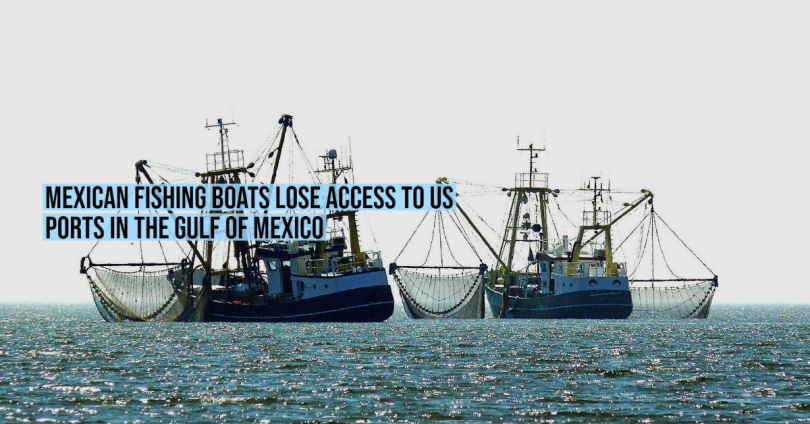[ad_1]
Mexican fishing boats have been prohibited from entering US ports in the Gulf of Mexico. The sanction is in response to the decision of the National Office of Oceanic and Atmospheric Administration (NOAA, for its acronym in English) to give the Latin American country a “negative certification” after registering an increase in illegal fishing in US waters. The agency stated that it did not have “sufficient evidence” that Mexico had taken appropriate actions to address the problem.
Mexico has been in the US crosshairs since 2019. That year the Mexican authorities were informed by NOAA that Mexico had been identified as one of the countries with illegal fishing in the US Exclusive Economic Zone. Since then there have been meetings between governments to strengthen actions against this activity. In a report to the US Congress, delivered in August 2021, NOAA values ”some progress” on the part of Mexico, but considers that they have not been enough to end this practice.

Reports of illegal fishing by Mexican boats reached 138 in 2020, twice as many as in 2019. In addition, from October 2019 to September 2020, the US arrested 107 people who reoffended in this activity, compared to 63 in a year before. In just six months, from September 2020 to February 2021, another 84 repeat offenders were arrested. The report mentions the possibility that illegally fished merchandise is being imported into US waters. Mexico is mentioned along with six other countries, including Russia, Taiwan, China, Costa Rica, Guyana, and Senegal. Mexico has also been included in a second list of thirty nations for incidental catches of protected species such as loggerhead turtles.
As a result of this report, the US imposed a ban on Mexico entering its fishing ports in mid-January, effective as of Monday. For the sanction to be lifted, NOAA affirms that a decrease in the number of incursions by Mexican boats and in the number of repeat offenders is required. “The US is committed to working with the Government of Mexico to support its actions (…) and is ready to restore privileges in US ports once actions are taken,” NOAA reported in January.
Receive the PVDN newsletter, exclusive content, and Whatsapp messaging for emergency alerts, by becoming a PVDN Supporter, Become a Sponsor here.Or if you would like to make a one-time donation to show support for independent news make a donation here.
The Secretary of Economy of Mexico, Tatiana Clouthier, has affirmed this Monday in an interview with Carmen Aristegui that meetings will be held to try to lift the ban, although a schedule hasn’t been determined. “In a few more days we will have a meeting with environmental organizations to see how we are going to do it,” she said. The Mexican fishing sector is the livelihood of 300,000 families and represents an annual income of approximately 38 billion pesos, according to 2017 figures cited by Oceana, an NGO dedicated to maritime conservation.
The impact of the US ban is multiple, according to Renata Terrazas, vice president of Oceana. “The most immediate is the case of the boats that go to US ports to buy gasoline or sell fish. On the other hand, this makes the fishermen who export concerned. The US is the largest trading partner, which buys the most products from the sea. This is the second time in less than a year that the US government has sanctioned the southern neighbor. In April of last year, the US banned imports of Mexican shrimp because it detected that the vessels were not correctly using a device to prevent the bycatch of sea turtles. The sanction was lifted in October, six months later.
Oceana has called on the Mexican government to promote a new traceability standard that allows knowing the origin of the products. The project has been detained at the National Aquaculture and Fisheries Commission (Conapesca) since March 2021, according to the NGO. “If they activate the rule, it could give the US certainty that we are taking the problem seriously,” says Terrazas. “Fishing in Mexico looks like a 19th-century activity. It needs to be at the level of international markets, of consumers who are looking for more and more sustainable products”.
Trending Stories Right Now on PVDN
- ADO accident leaves eight dead on the Mérida-Cancún highway An ADO passenger bus accident that occurred on the morning of this February 6, near the community of Nuevo Xcán, in Quintana Roo, has so far left a balance of 19 injured and 8 dead. According to official information, the ADO company passenger bus allegedly overturned after a dump truck, which was loaded with material…
- Coronavirus in Mexico: Latest news today, February 6 The Ministry of Health (SSa), through the daily technical statement, reported that this Sunday, February 6, 129 deaths and 10,234 new cases of COVID-19 were registered in the country. With such figures, 5,151,525 infections and 309,546 deaths caused by SARS-CoV-2 were accumulated nationwide. According to the demographic data of the epidemic, confirmed cases show predominance…
- Vidanta Cruises, Mexico’s First-Ever Luxury Cruise Line, will sail from Nuevo Vallarta on April 14 (Press Release) – Grupo Vidanta has spent the last 47 years creating extraordinary vacation experiences in the country’s most beautiful destinations. Now, Latin America’s leading name in entertainment and destination resorts presents the exclusive preview itinerary of Vidanta Cruises, Mexico’s first-ever luxury cruise line. The exclusive preview is available to guests of Vidanta Nuevo Vallarta…
- ‘Do not travel to Mexico’: CDC updates travel alert to maximum risk The United States Centers for Disease Control and Prevention (CDC) updated its COVID travel alert for Mexico on Monday, recommending not to visit the country. In their update, the center highlighted the risk of becoming infected with the SARS-CoV-2 virus during trips to Mexico even if visitors have their full vaccination schedule. In December, the…
- Mexican cartels now use IEDs as well as bomb-dropping drones In the war raging between drug cartels in western Mexico, gangs have begun using improvised explosive devices (IEDs) on roads to disable army vehicles. The self-defense movement in the town of Tepalcatepec, in western Michoacan state, said improvised land mines severely damaged an army armored car late last week. A spokesman for the movement, which…

[ad_2]
Source link








